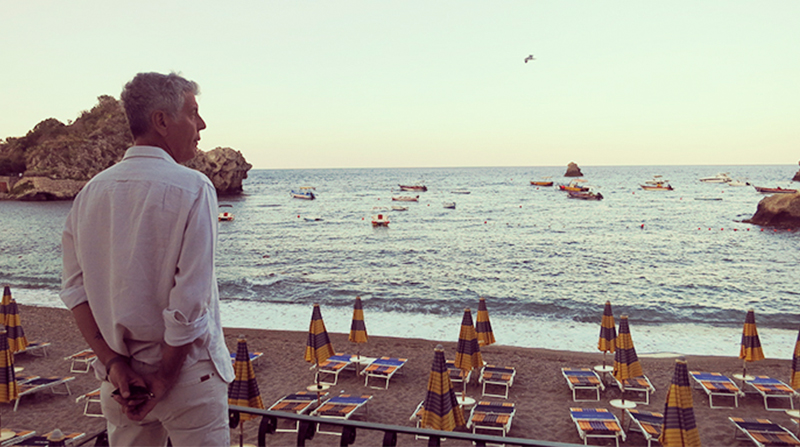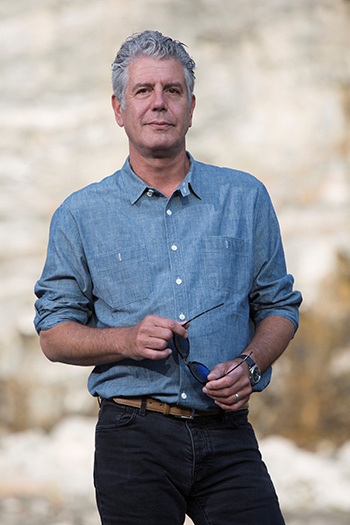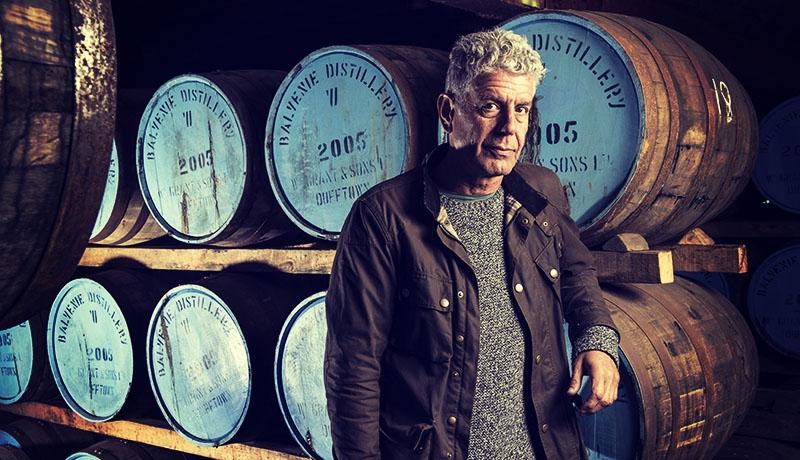

Anthony Bourdain. Credit: CNN/Parts Unknown
No-holds-barred chef and avid globetrotter Anthony Bourdain sadly passed away on June 8 while filming his Emmy Award-winning CNN series Parts Unknown in France. The famously forthright TV personality skyrocketed to fame after writing his hugely successful book Kitchen Confidential: Adventures in the Culinary Underbelly in 2000.
More than just a celebrity chef and food writer, Bourdain, 61, was, at his core, a storyteller. He used his fame as a voice for underserved communities and to campaign for safer working conditions in restaurants.
Never one to take life too seriously, he traveled the world with a camera crew by his side, showing us the most beautiful, gritty and unexpectedly tasty spots across the globe, never without a twist of his signature dark humor and sarcastic wit.
We’ve had the honor of interviewing the multi-talented toque many times over the years. Here, in his own words, are just a few of the lessons we’ve learned from the culinary giant.

Credit: CNN
On Smart Packing
I check my luggage. I do not want to be one of those annoying people who can’t fit their carry-on into the overhead. I pack for security — I like to fly through security very quickly. I don’t want to be annoying to other passengers, so I check stuff.
I have a carry-on with my essentials. I pack an extra-scrunchy coat with my electronics. If I need a pillow to sleep on an airport floor for 12 or 14 hours, it’s there. I have a few books loaded onto my iPad, maybe a couple of movies. I’m prepared for things to go wrong because they do go wrong all of the time.
On the Best Food Cities
If I had to eat in one city for the rest of my life, I would probably pick Tokyo because it’s just so deep with delicious and crazy stuff to enjoy. I love the food; it’s fairly low impact — just a good bowl of ramen or a good izakaya for some yakitori [grilled chicken skewers] would make me very happy in Tokyo.
I [also] love landing in Rome and going right out for some cacio e pepe [a cheese and pepper spaghetti dish] or a local, regional pasta. That makes me happy.
On New York City
My whole working career was there; there’s a certain expectation that would be unsatisfied living anywhere else. I like being able to pick up the phone and call out for sushi, pad Thai, pizza, Italian or Lebanese food. It’s a 24-hour city. All of my friends are there.
Most of my friends are chefs. It’s a comfortable fish tank for me. And it’s also a level of aggression at a fast pace that’s good for me. I’m not a person who should spend a lot of time in a log cabin staring out at beautiful vistas contemplating the mysteries of the universe.
On Souvenir Shopping
I’ve been to so many places and brought back so many figurines and examples of indigenous artwork. My apartment was starting to look like Colonel Blimp’s clubroom. So, I don’t really bring things home anymore.
I get snow globes from airports for my daughter. If something really, really speaks to me I’ll get it — little objects of art, or an interesting old poster, particularly the ones trumpeting dream vacations for Europeans in colonies that no longer exist.
I stopped with the T-shirts. I stopped with the opium pipes, the masks — all of that. I stopped taking pictures, as well. I travel with a camera crew, so I’m reasonably sure we got the image.

Credit: The Balvenie
On Being A Smarter Traveler
Well, it’s just what you shouldn’t do. If you’re in Venice, and there are a bunch of Americans dining in the restaurant, you’re obviously in the wrong place. If you’re looking for the best deli in New York, and there are no New Yorkers eating there — they’re all Texans — uh, you’re in the wrong place. There’s nothing wrong with Texans; it’s just you want to be eating in the deli that New Yorkers go to because it’s their thing.
A barbecue joint with nothing but tourists is worrisome. You want to find the back-alley place where all the locals go. That’s what we’re looking for.
We ask locals, “Where do you go that no one else knows about, just you and your friends? Where do you go when you’re drunk at 2 o’clock in the morning that’s going to make you feel better and happy? What’s the first place you miss when you’re gone for a long time?”
So, we reach out and ask people on the ground these kinds of questions, and we pursue them until we get it right.
